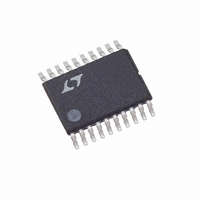LT5503EFE#TR Linear Technology, LT5503EFE#TR Datasheet - Page 13

LT5503EFE#TR
Manufacturer Part Number
LT5503EFE#TR
Description
IC DIRECT IQ MOD/MIXER 20-TSSOP
Manufacturer
Linear Technology
Datasheet
1.LT5503EFE.pdf
(20 pages)
Specifications of LT5503EFE#TR
Function
Modulator/Mixer
Lo Frequency
1.4GHz ~ 2.4GHz
Rf Frequency
1.7GHz ~ 2.7GHz
P1db
-15dBm
Noise Floor
-152dBm/Hz
Output Power
12.7dBm
Current - Supply
38mA
Voltage - Supply
1.8 V ~ 5.25 V
Test Frequency
2.4GHz
Package / Case
20-TSSOP Exposed Pad, 20-eTSSOP, 20-HTSSOP
Pin Count
20
Screening Level
Industrial
Lead Free Status / RoHS Status
Contains lead / RoHS non-compliant
Other names
LT5503EFETR
Available stocks
Company
Part Number
Manufacturer
Quantity
Price
APPLICATIO S I FOR ATIO
The LT5503 consists of a direct quadrature modulator and
a mixer. The mixer operates over the range of 1.7GHz to
2.7GHz, and the modulator operates with an output range
of 1.2GHz to 2.7GHz. The LT5503 is designed specifically
for high accuracy digital modulation with supply voltages
as low as 1.8V. It is suitable for IEEE 802.11b wireless local
area network (WLAN), MMDS and wireless local loop
(WLL) transmitters.
A dual-conversion RF system requires two local oscilla-
tors to convert signals between the baseband and RF
domains (see Figure 2). The LT5503’s double-balanced
mixer can be used to generate the LT5503 modulator’s
high frequency carrier input (MODRFIN) by mixing the
systems 1st and 2nd local oscillators (LO1 and LO2). In
this case, a bandpass filter is required to select the desired
mixer output for the modulator input. The mixer’s RF
differential output produces –12dBm typically at 2.45GHz
and the modulator MODIN pin requires ≥ –16dBm, driven
single-ended. This allows approximately 4dB margin for
U
U
Figure 2. Example System Block Diagram for a Dual Conversion System
LT5500
LNA
W
LT5503
VGA
U
90°
0°
bandpass filter loss. The balanced output from the modu-
lator is applied to a variable gain amplifier (VGA) that
provides a single-ended output. Note that the modulator
can also be used independently of the mixer, freeing the
mixer to be used anywhere in the system. In this case,
MODRFIN will be driven from an external frequency source.
Modulator Baseband
The baseband I and Q inputs (BI
internally biased to 1.4V to maximize the input signal
range at low supply voltage. This bias voltage is stable over
temperature, and increases by approximately 50mV at the
maximum supply voltage. The modulator I and Q inputs
have very wide bandwidth (120MHz typical), making the
LT5503 suitable for even the most wideband modulation
applications. For best carrier suppression and lowest
distortion, differential input drive should be used. Single-
ended drive is possible too, with the unused inputs AC-
coupled to ground.
LT5502
LT5506
Q
I
÷2
D/A
D/A
0°
90°
÷2
÷1
1ST LO
I
Q
+
/BI
2ND LO
–
A/D
A/D
5503 F02
and BQ
LT5503
+
/BQ
13
–
) are
5503f













